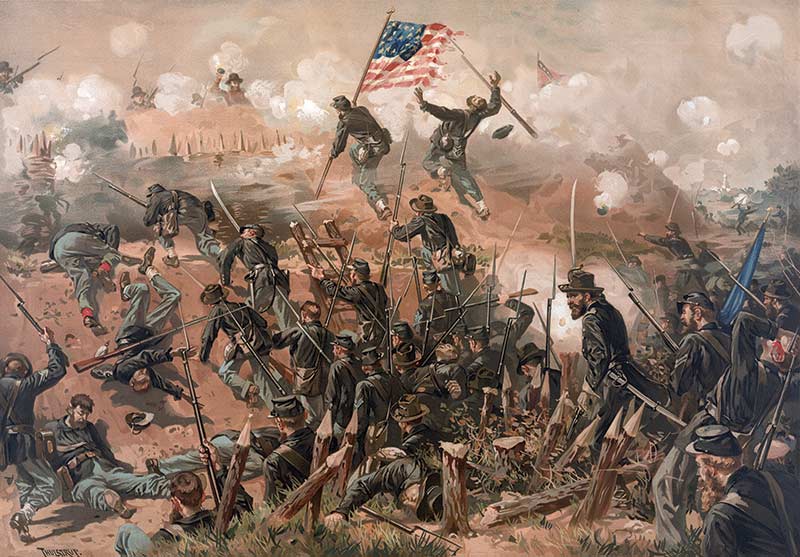
Will’s friend has an M1855 Harper’s Ferry pistol like this
one with a most curious story. Photo: Rock Island Auction
I have a friend who has in his possession a vintage M1855 Harper’s Ferry horse pistol. This single-shot hand cannon was obsolete by the onset of the American Civil War. How my friend came into this extraordinary artifact is a compelling tale indeed.
My buddy is old Mississippi. His family owned a sprawling plantation outside Vicksburg back during the 1860s. By 1863, the American Civil War was in its third year, and the country was already well-blooded. With the men off fighting for the Confederacy, the family homestead was left in the care of the women and the slaves. As fate would have it, it was this strategic spot of dirt upon which General Grant landed.
Vicksburg occupied a strategic promontory overlooking the expansive Mississippi River. Whoever controlled Vicksburg controlled the river. Whoever controlled the river controlled trade in and out of the South. The war hinged on such stuff as this.
The Villain
For the pending siege, U.S. Grant commanded 70,000 Federal troops. Arrayed against them were 33,000 Confederates under John Pemberton. Grant and his entourage passed through the old family place with dispatch. One of his staff officers confiscated a horse, but the advancing Federals left the place otherwise unmolested. For the moment, it looked like the immediate crisis had passed.
The following day, a drunken Union officer appeared. This man was clearly a straggler, and he was three sheets to the wind. Before moving on to catch up with Grant’s command team, the inebriated soldier thought he might take a moment to get to know the fairer members of the family. The matron of the house posted herself in the doorway, barring his entry.
Meanwhile …
As this noisy little drama was unfolding, one of the family slaves was busy breaking up the soil in front of the manor house in anticipation of planting a fresh rose bed. Inside the domicile was indeed the flower of Southern femininity. Sadly, the matriarch was a slight woman. She would not slow this drunken miscreant down for long.
The slave spontaneously ceased his work and advanced up the broad steps of the family home while the drunkard tried to push his way past the Ole Miss. With minimal fanfare, the enslaved man then buried his pickaxe up to its shaft in the back of the randy Federal officer’s head. The man was dead where he dropped.
Fallout
The lady of the house was rightfully discomfited. While the Civil War pitted brother against brother, it was still a most dreadful war with all of the concomitant horrors.
Once word got out that they had killed a Union officer, she expected Grant and company would hang them all and fire the grounds. The murderous slave, however, had another idea. He helpfully observed that he was right in the middle of digging a lovely rose bed …
In short order, the dead soldier’s cooling corpse was arrayed underneath the rose bushes. The lady of the house hid the man’s pistol deep among the family things. In due time, it passed down to my buddy.
Once the hostilities were complete, the Union officer who had taken the family horse was posted to the Army of Occupation in New Orleans. Despite the intervening two long bloody years, this diligent soldier posted a letter to the family apologizing for having taken the animal after his own mount came up lame. Enclosed, he included fair payment for the beast. That letter still remains in the family as well. No one ever inquired after the dead man. His body remains undisturbed to this very day.
Ruminations
More than 600,000 American soldiers perished during the Civil War. One of them died with a pickaxe through his brain on the front porch of a Vicksburg plantation house. Associated artifacts were passed down through the generations to the present day.
In 1932, a German journalist, satirist, and pacifist named Kurt Tucholsky wrote, “The death of one man: This is a catastrophe. Hundreds of thousands of deaths: That is a statistic!” This darkly prescient quote has since been attributed to both Stalin and Mao. In this forgotten Union officer’s gory demise, we see that timeless axiom embodied.
Union forces suffered 4,910 casualties during the siege; Confederate losses six times that. However, those are just numbers. In the unlikely person of this aspiring alcoholic rapist and the enslaved man who killed for the family that owned him, we see the true humanity of the war. That curious dichotomy intrigues me to this very day.